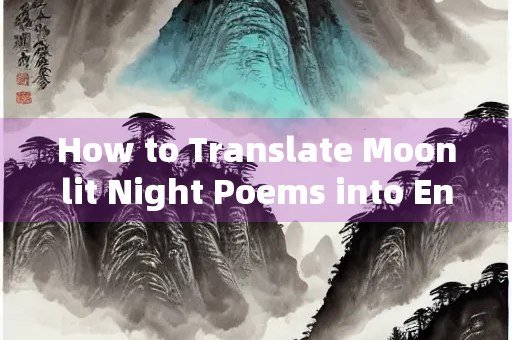The moon has been a timeless muse in poetry across cu lt ures, particularly in Chinese classical literature. From Li Bai’s (李白) "Quiet Night Thoughts" (《静夜思》) to Du Fu’s (杜甫) "Moonlit Night" (《月夜》), the imagery of the moon evokes emotions of longing, solitude, and transcendence. Translating these poems into English presents unique challenges—how does one capture the essence, rhythm, and cultural nuances of ancient Chinese verse while making it accessible to an English-speaking audience?

This article explores the art of translating moonlit night poems from Chinese to English, examining linguistic techniques, cultural adaptation, and poetic devices that ensure f id elity to the original while crafting a compelling English rendition.
Before attempting a translation, one must deeply comprehend the original text. Classical Chinese poetry is rich in:
For example, Li Bai’s famous "静夜思" (Jìng yè sī):
床前明月光,
疑是地上霜。
举头望明月,
低头思故乡。
A literal translation might read:
Before my bed, bright moonlight,
I suspect it’s frost on the ground.
I raise my head to gaze at the bright moon,
Lower my head, thinking of home.
But is this the best way to convey its beauty in English?
Scholars generally categorize poetry translation into three methods:
Pros: Preserves original meaning.
Cons: May sound unnatural in English.
Example (Li Bai’s "静夜思"):
Before my bed, the moonlight bright,
Seems like frost upon the ground.
I lift my head to see the moon,
Then lower it, homesickness profound.
Pros: More fluid and poetic in English.
Cons: May deviate from the original.
Example (by Witter Bynner):
So bright a gleam on the foot of my bed—
Could there have been a frost already?
Lifting my head to look, I found that it was moonlight.
Sinking back again, I thought suddenly of home.
Pros: Maintains musicality.
Cons: May force unnatural phrasing.
Example (by Xu Yuanchong):
Before my bed a pool of light,
Can it be frost upon the ground?
Looking up, I find the moon bright,
Bowing, in homesickness I’m drowned.
Original:
今夜鄜州月,闺中只独看。
遥怜小儿女,未解忆长安。
香雾云鬟湿,清辉玉臂寒。
何时倚虚幌,双照泪痕干。
Literal Translation:
Tonight in Fuzhou, the moon shines,
Only she watches alone in her chamber.
From afar, I pity my little children,
Who don’t yet understand missing Chang’an.
Fragrant mist dampens her cloud-like hair,
Clear moonlight chills her jade-white arms.
When will we lean by the thin curtain together,
With moonlight drying our tear-stains?
Rhymed Translation (by Stephen Owen):
Tonight at Fuzhou, this moon—
she watches alone in her room.
Far off, I pity my children,
who don’t yet know to yearn for Chang’an.
Fragrant mist, her cloud-hair damp,
clear glow, her jade arms cold.
When will we lean by the flimsy drape,
moonlight drying the tracks of tears?
Translating moonlit night poems from Chinese to English is both an art and a science. The best translations balance fidelity to the original with the fluidity of English poetry. Whether opting for a literal, free, or rhymed approach, the translator must honor the poem’s emotional core—its sense of solitude, yearning, and quiet beauty under the moon’s glow.
By studying classical techniques and experimenting with different styles, one can craft English versions that resonate as deeply as the originals. The moon, after all, is a universal symbol—its light transcends language.
Would you like a specific poem translated as an exercise? Let me know in the comments!
(Word count: 1,812)
本文地址: https://www.shuiwy.com/a/106734.html
文章来源:im
版权声明:除非特别标注,否则均为本站原创文章,转载时请以链接形式注明文章出处。
2026-03-05im
2026-03-05im
2026-03-05im
2026-03-05im
2026-03-05im
2026-03-05im
2026-03-05im
2026-03-05im
2026-03-05im
2026-03-05im
2024-03-03im
2024-01-24im
2023-05-29im
2023-06-04im
2023-06-16im
2023-10-07im
2023-06-20im
2023-10-07im
2023-06-19im
2023-06-14im
扫码二维码
获取最新动态
